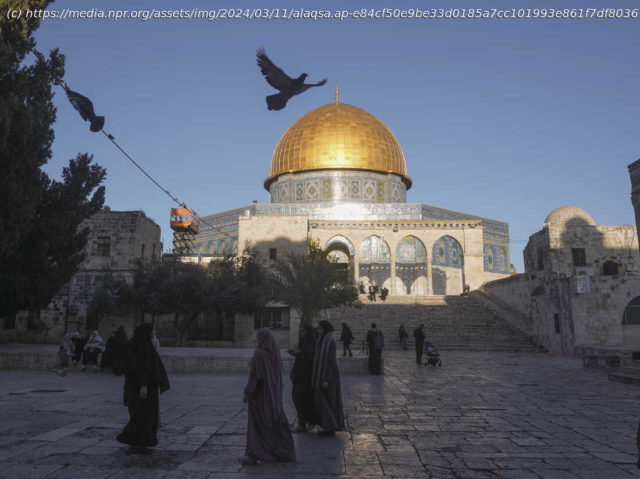Questions remain about access to the main Islamic congregational mosque in the Al-Aqsa compound in Jerusalem’s Old City as Palestinians see the site as essential to their identity.
The Muslim holy month of Ramadan arrived Monday with no news of a cease-fire in Gaza, raising further concerns about tensions spreading to Jerusalem, where the Al-Aqsa mosque sits at the very center of the Israeli-Palestinian conflict.
On Sunday, Israeli police denied entry to many Palestinian men for the first night of Ramadan prayers. At one gate, police charged at the crowd back and hit people with batons.
Since the Oct. 7 attack by Hamas, Israel has restricted Palestinian access to Al-Aqsa. Men and teenage boys under the age of 45, and Palestinians living in the occupied West Bank have not been allowed for months. Some have been praying outside the walls of the old city.
Last week, Prime Minister Benjamin Netanyahu’s office said Israel would allow access to Al-Aqsa as it had in previous years – when nearly everyone was allowed – at least for the first week. Each following week during the month-long holiday would be assessed afterward, Netanyahu’s office said, overruling the far-right minister of national security Itamar Ben-Gvir, who advocated for a near blanket ban, including on Muslims with Israeli citizenship.
The Jerusalem district command for the Israel police did not respond to NPR’s request for comment.
The compound, which Muslims refer to as Al Haram Al Sharif, is made up of the iconic Dome of The Rock, the Al-Aqsa mosque – with the smaller gray dome, museums and other institutions – and is on a site that is holy to both Muslims and Jews, who know it as the Temple Mount, where the ancient temple stood 2,000 years ago.
As part of a longstanding agreement aimed at maintaining religious balance since Israel captured the old city from Jordan in 1967, Muslims pray at Al-Aqsa, while Jews pray at the Western Wall, the base of the ancient second temple. But a growing movement of ultra-Orthodox and ultra-nationalist Jews have been going to the compound to pray, accompanied by Israeli police.
Home
United States
USA — Science As Ramadan begins, uncertainty and anxiety surround the Al-Aqsa mosque






